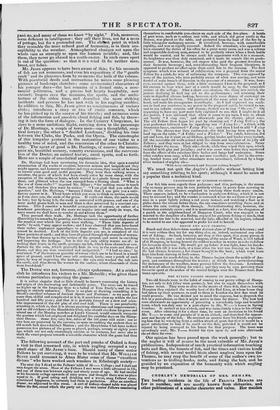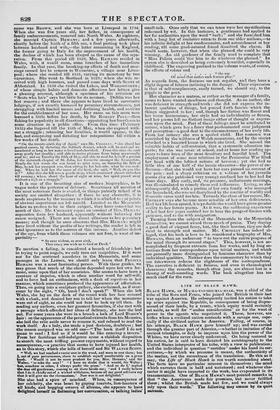MORLEY'S MEMORIALS OF MRS. NEMANS.
THE leading incidents in the life of FELICIA HEMANS are few in number, and are mostly known from obituaries, and other publications of a similar character and value. Her maiden name was BROWN, and she was born at Liverpool in 1794. When she was five years old, her father, in consequence of family embarrassments, removed into North Wales. At eighteen, she married Captain HEMANS ; and a few years afterwards, shortly before the birth of a fifth son, a final parting took place between husband and wife,—the latter remaining in England, the former going to Italy for the improvement of his health, the decline of which has been alleged as the cause of the sepa- ration. From this period till 1828, Mrs. HEMANS resided in Wales, with, it would seem, some branches of her immediate family. In that year, the breaking-up effects of death and mar- riage caused her to remove to We.vertree, a village near Liver- pool; where she resided till 1831, varying its monotony by two excursions. She went to Scotland in 1829; when she was re- ceived with high honours, and passed some days with SCOTT at Abbotsford. In 1830 she visited the Lakes, and WORDSWORTH ; of whose simple habits and domestic affections her letters give a pleasing account, although a specimen of his criticism on "Scots wha lia'e" says but little for its acumen. Dublin was her last remove ; and there she appears to have lived in successive lodgings, if not exactly harassed by pecuniary circumstances, yet struggling with limited means and declining health, and anxious for the establishment of her sons. Her cares on this score were lessened a little before her death, by Sir ROBERT PEEL—then fishing for popularity in all directions—appointing her fourth sun to some situation in a public office. From this time (February 1835) she lingered till the 16th of May, when she expired with- out a struggle ; retaining her faculties, it would appear, to the last, and composing and dictating her compositions till within a few weeks of her death.
"On the twenty-sixth day of April," says Mr. CHORLEY, "sire closed her poetical career, by dictating the Sabbath Sonnet, which will be read and rie• membered as long as her name is loved and cherished. From this time she sank away gently but steadily ; still able to derive pleasure from being occasionally read to ; and on Tuesday the 12th of May, still able to read for herself a portion of the sixteenth chapter of St. John, her favourite amongst the Evangelists. Nearly the last words she was heard to utter were, on Saturday the 16th of lay, to ask her youngest son, then sitting by her bed-side, what he was read- ing. When he told her the name of the book, she said, " Well, do you like it ?" After this she fell into a gentle sleep, which continued almost unbroken till evening ; when, about the hour of eight or nine, her spirit passed away without a sigh or a struggle."
It is one of the besetting sins of modern s,biographies, to be vague under the pretence of delicacy. Sometimes all mention of the most notorious facts is evaded, or things publicly talked of in society are omitted altogether : if there be any obscurity, it is made suspicious by the manner in which it is alluded to ; or points a obvious importance are left untold. Limited as the Memorials before us profess to be in their subject, they have somewhat too much of this. Mr. CHORLEY copies an account of Mrs. Ilesekes' separation from her husband, apparently without believing the cause assigned. There are no direct allusions to her pecuniary means; and though he once observes that Mrs. Ilesisss might have lived without the profits of her writings, the reader is left in total ignorance as to the sources of this income. Another defect of the age, from which these volumes are not free, is want of im- partiality— " So over violent, or over civil, That eve. y one with us is God or Devil."
To mention a failing, is considered a breach of friendship : but in trying to paint angels, we only turn out insipidities. If it were not for the scattered anecdotes in the Memorials, and some passages in the Letters, we should only learn that FELICIA HEMANS was a most fascinating person. With these guides, we may guess that much of the charm depended upon her own hu- mour, some upon that of her associates. She seems to have been a creature of impulse, which is often another word for self-will; and to have had an enthusiasm, with a dash of capriccio in her manner, which sometimes produced the appearance of affectation. Thus, on going into a sculpture.gallery, she exclaimed, as if over- come by the sight, " Oh, hush ! don't speak!" When she left Wales, she lay on the deck of the vessel with her face covered with a cloak, and desired her son to tell her when the mountains were out of sight, as she could not bear to look up till then. In reading any authors, even her greatest favourites, if she met with a passage which offended her ideas of delicacy, she tore the leaf out. For some years she wore in a brooch a lock of Lord BYRON'S Lair: on the appearance of the periodical extracts from his Memoirs, she laid the relic aside never to resume it, and refused to read the work itself. As a lady, she made a just decision, doubtless ; but the reason assigned was an odd one—" The book itself I do not mean to read : I feel as if it would be like entering a tavern." From her fastidious self-indulgence arose a childish disposition to snatch the most trifling present enjoyments, without regard to consequences,—a practice that seems to have injured her health, as in this story, which she tells of herself and Sir WALTER SCOTT. "Well, we had reached a rustic seat in the wood, and were to rest there; but I, out of pure perverseness chose to establish myself comfortably on a grass Lank. Would it not be more prudent for you, Mrs. llemans,' said Sir Walter, 'to take the seat?' ' I have no doubt that it would, Sir Walter ; but, somehow or other, I always prefer the grass." And so do I,' replied the dear old gentleman, coining to sit there beside me; and I really believe that I do it chiefly out of a wicked wilfulness, because all my good advisers say that it will give ore the rheumatism.' Now was it not delightful."
She also had a spice of mischief. When, in consequence of her celebrity, she was beset by gaping tourists, lion-hunters of all kinds, and begging owners of albums, she appears to have delighted herself in flattening her conversation, or talking ladies' small-talk. Once only that we can trace were her rnystifications redeemed by wit. In this instance, a gentleman had applied to her for authorities upon the word" barb;" and she furnished him with a long list of imitative extracts from our older authors,—to his infinite delight at her condescension, and astonishment at her reading, till some good-natured friend dissolved the charm. It would seem, however, that when she pleased she could be very winning. An old gardener of the family used to complain that " Miss Felicia could 'lice him to do whatever she pleased." In person she is described as being extremely beautiful, especially in childhood. The engraving prefixed to the volume wants, of course, the effects of colour and "the ray Of mind that makes each feature play."
As regards form, the features are not regular, and they have a slight degree of fulness inclining to the dumpy. Their expression is that of sells-complacency, easily turned, we should say, to the giggle or the pout.
Her character as a matron, or rather as the manager of a family, seems to have wanted steadiness and thought. As an author, she was deficient in strength and truth : she did not express the in- herent qualities of things, but poured forth fancies which the things suggested to her ; and, though her diction was fluent and her verse harmonious, her style had no individuality or fitness, and her poems left no distinct image either of thought or expres- sion upon the mind. Part of these failings must be attributed to nature, which gave her a fancy that predominated over judgment and perception—a good deal to the circumstances of her early life. From her infancy she was a spoiled child. Her romance was nourished by the wildness of Welsh mountains, and by the stories attached to a haunted house in which she lived. She missed the valuable habits of self-restraint, that a systematic education im- parts; for she was never at school, and at home her reading ap- pears to have been of the most desultory and fanciful kind. The employment of some near relations in the Peninsular War filled her head with the loftiest notions of heroism ; yet she had so little idea of one half of the heroic character—the power of en- durance—that she would not have her cars pierced on account of the pain : and a sharp criticism on a volume of her juvenile poems (for she published very young) confined her to her bed for three days. Her early, and, we presume, unfortunate marriage, was ill-calculated to remedy these evil influences. Living, as she subsequently did, with a portion of her own family who managed the household, she was not disciplined by the routine of worldly and domestic cares until too late. Towards the close of her career, Mr. CHORLEY says she became more sensible of her own deficiencies. Had her life been spared, it is probable she would have given greater reality to her future poems. As it was, the saddening experience of her last few years enabled her to bear the pangs of disease with patience, and to die with resignation. Turning from the subject of the Memorials to the Memorials themselves, we cannot award them much of praise. They display a good deal of elegant fancy, but, like their heroine, they are defi- cient in strength and matter. Mr. CHORLEY has indeed al- leged, that his book is less to be considered a biography of Mrs. HEMANS, than an endeavour " to trace out the entire progress of her mind through its several stages." This, however, is not ac- complished by frequent extracts from her works, and by long se- lections from her correspondence upon trivial matters, and which are generally more distinguished by feminine character than by individual qualities. Neither does the commentary by which they are interwoven redeem the slightness of the correspondence. The narrative is deficient in fulness, and even in chronological clearness; the remarks, though often just, are almost lost in a throng of well-sounding words. The book altogether has too much chaff for the corn.



























 Previous page
Previous page